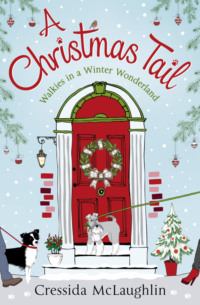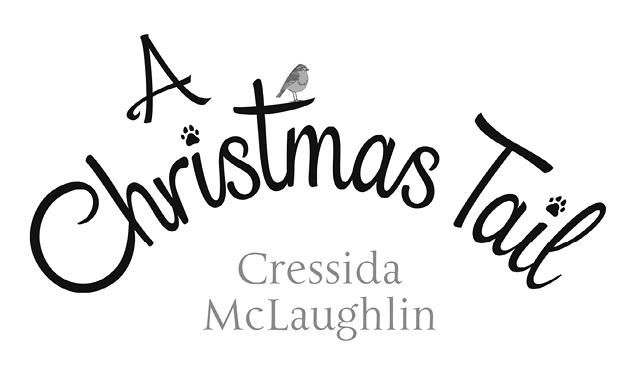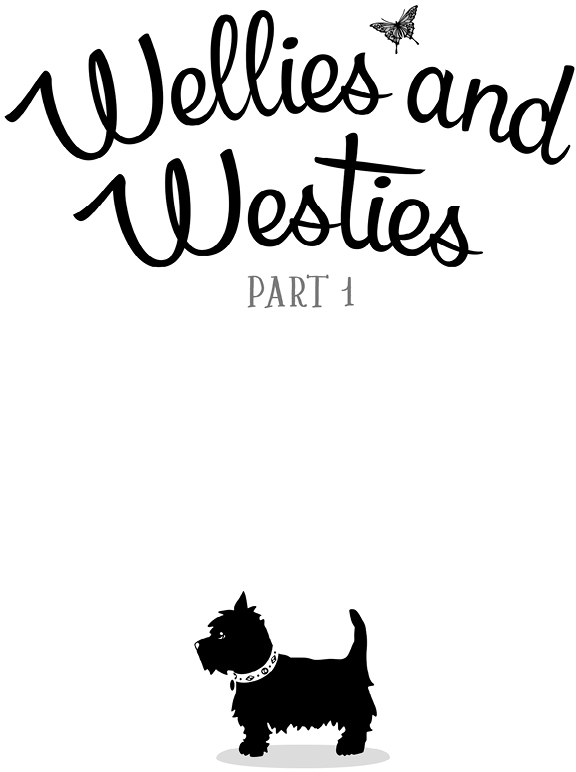
A Christmas Tail: A heart-warming Christmas romance


The Complete Primrose Terrace

Harper
An imprint of HarperCollinsPublishers Ltd
The News Building
1 London Bridge Street
London SE1 9GF
www.harpercollins.co.uk
First published in Great Britain as four separate ebooks in 2015 by HarperCollinsPublishers
First published as one edition in 2015 by HarperCollinsPublishers
Copyright © HarperCollinsPublishers 2015
Cover layout design © HarperCollinsPublishers Ltd 2015
Cover images © Shutterstock.com
Cressida McLaughlin asserts the moral right to be identified as the author of this work.
A catalogue copy of this book is available from the British Library.
This novel is entirely a work of fiction. The names, characters and incidents portrayed in it are the work of the author’s imagination. Any resemblance to actual persons, living or dead, events or localities is entirely coincidental.
All rights reserved under International and Pan-American Copyright Conventions. By payment of the required fees, you have been granted the non-exclusive, non-transferable right to access and read the text of this e-book on screen. No part of this text may be reproduced, transmitted, down-loaded, decompiled, reverse engineered, or stored in or introduced into any information storage and retrieval system, in any form or by any means, whether electronic or mechanical, now known or hereinafter invented, without the express written permission of HarperCollins.
Ebook Edition © November 2015 ISBN: 9780008136024
Version 2015-10-06
To my family: Mum, Dad, Lucy and David.
Contents
Cover
Title Page
Copyright
Dedication
Part 1: Wellies and Westies
Chapter 1
Chapter 2
Chapter 3
Chapter 4
Chapter 5
Chapter 6
Part 2: Sunshine and Spaniels
Chapter 7
Chapter 8
Chapter 9
Chapter 10
Chapter 11
Chapter 12
Part 3: Raincoats and Retrievers
Chapter 13
Chapter 14
Chapter 15
Chapter 16
Chapter 17
Chapter 18
Part 4: Tinsel and Terriers
Chapter 19
Chapter 20
Chapter 21
Chapter 22
Chapter 23
Chapter 24
Chapter 25
Christmas Day on Primrose Terrace
Acknowledgements
Keep Reading
Find Your Inner Doggess Quiz
A Q&A with Cressy
About the Author
About the Publisher


‘Now, just stay in the bag until I say so, OK? This could go one of two ways.’
Cat pushed the furry head back into her cavernous turquoise handbag and hoisted it up on her shoulder, pushing a strand of her pixie-cut chestnut hair out of her eyes. The sun was hesitant, the early March day too cold to be called balmy, but it was trying hard, and the thought that they were at last leaving winter behind gave Cat a spring in her step. She approached the main doors of Fairview Nursery, nodding and smiling at the clutches of parents, some with older children on their way to primary school, most with pushchairs, hoping that none of them would notice her bag’s unusual bulge. Alison was already in the office, printing off the day’s register and listening intently to messages on the answerphone; parents calling to say their child was ill and would be absent from nursery, someone wondering about the Easter opening hours.
Cat lifted her bag off her shoulder and placed it carefully on the chair next to the coat hooks. It wriggled, her keys jingling alarmingly, and Alison flashed her a questioning look, her neat, dark brows knitting together below her glossy fringe. Cat shrugged off her coat and scarf, hung them up and filled the kettle.
‘Good morning,’ Alison said when the messages had finished. ‘Did you have a nice weekend?’
‘Yes, thanks. A couple of nice long walks, a lie-in, a meal out with my friend.’
‘Polly?’
‘That’s right.’
‘The one you’re living with?’
‘Yes, and her brother.’ Cat stirred milk into her tea, and put a single sugar in Alison’s coffee. ‘I’ve known her for years, and when this job came up, they…’ she stuttered, ‘they had space so…’ Her words trailed away, and she wondered how her boss, a few years older than her and about three inches shorter, could make her feel as if she was always on trial for something. Or maybe it was just today, because looking at Alison, and listening to the muffled sounds coming from her handbag, Cat knew that she had made the worst decision since her move to Fairview.
She blew on her tea, attempting nonchalance. ‘How was your weekend?’
‘Good.’ Alison nodded once. ‘Can you come and help me get the children’s coats off? I’ll be letting them in shortly.’
Cat rolled her eyes. As ever, she was denied a glimpse into her boss’s personal life, any titbit of information that might help Cat understand why a woman in her early thirties could be completely devoid of warmth, and yet be in charge of a nursery. Cat prided herself on her ability to get to know people, but Alison was an impossible case.
She followed her into the classroom. Miniature chairs and tables were set out in front of a whiteboard, and there was a soft red carpet with scattered beanbags laid out for story time. The craft area, with a sink, bottles of squeezy paints and a jumble of brightly coloured aprons, was in the far corner.
‘We’ll take the register on the carpet, then move into the first activity, exploring different sounds.’
‘Sure.’ Cat knew all this. Alison planned out her lessons in minute detail, and gave Cat a briefing every Friday afternoon on the following week’s plans, ensuring there was no room for error or spontaneity. Cat longed to say something, but as the assistant, and only two months into the job, she had tried to stay in line. Until today, anyway.
In the playground a couple of children, Peter and Tom, were pressing their noses up against the glass. Cat waved, and they waved back, their hands fingerless in woolly mittens. Behind them, Emma, four years old and one of the most mature children, waited patiently, her long hair in plaits, while her mother pushed her baby brother’s pram backwards and forwards. Emma was holding onto Olaf’s lead, the cocker spaniel puppy smelling the shoes of everyone around him, his tail wagging constantly.
‘I’m letting them in now,’ Alison said.
Cat’s wave froze in midair and her stomach lurched. The small dog brought her thoughts back to her bag, and what was inside.
‘Won’t be a sec,’ Cat called as she hurried out of the room.
Alison sighed loudly and flung open the double doors.
Cat’s handbag was on the floor, halfway across the office, and making progress towards the door.
What if Alison had seen it first? Would she have called the police? Thrown it outside? Cat knew then that her plan hadn’t just been stupid, it had been mind-numbingly ridiculous. She scooped the bag up, undid the zip further, and a black button nose snuffled to the opening, followed by a fluff of grey fur and then two dark eyes, looking up at her. Her heart stopped pounding and started to melt, as it always did when she saw Disco, her neighbour Elsie’s miniature schnauzer puppy.
‘Shhhh, Disco,’ she whispered. ‘We’re going into the other room now, so you’re going to have to be really still and really quiet.’ Cat followed her instructions with a treat from her pocket, knowing how futile they were. You didn’t have to be a dog expert to know that being still and quiet were two things that did not come naturally to a puppy. She put her handbag over her shoulder and, as casually as she could, went back into the classroom.
Alison was removing coats and hats, assisted by parents who were reluctant to let their young children go, even for a few hours, and she gave Cat a meaningful backwards glance. Cat placed her handbag at the back of the craft area, as far away from the carpet as possible. The bag emitted a tiny yelp, and Cat stuck her hand in, ruffled Disco’s thick, warm fur and zipped it half closed.
‘Cat?’ Alison called, her voice high and tight. ‘Any chance of some help?’
Cat hurried to the door and welcomed the children in, taking their outer layers off and helping them to hang them on the multicoloured coat hooks. Emma bent down to say goodbye to Olaf, and Alison appeared next to her, her short frame still imposing for a four-year old.
‘Come on, Emma,’ she said, ‘leave the dog now. Time to go inside.’
Emma’s mother put her hand on her daughter’s shoulder. ‘He’s called Olaf.’
‘Right,’ Alison said. ‘Well, we can’t have dogs inside – some of the children are allergic.’
‘You mean you’re allergic to fun,’ Cat muttered under her breath. Behind her, Peter, three years old, let out a bubble of laughter, his blue eyes bright with mischief.
‘Shhh,’ she said, ‘don’t tell on me.’ She gave Peter a grin and sent him off to the carpet. Emma took off her coat and Cat could see she was blinking furiously, trying to force the tears back to where they’d come from. Cat resisted the urge to give her a hug – she knew Emma wouldn’t want that – and a stronger urge to let Disco out, delight all the children and send Alison into meltdown. She watched as the nursery owner let the last of her charges in, closed the door and ran slender hands over her hair and skirt, before turning to face the children and clapping her hands.
They assembled on the carpet, Alison at the front on one of the beanbags, Cat cross-legged in the middle with children clustered around her. She was wearing a red and white flower-print dress over leggings and boots, and had painted her nails the colours of Smarties, knowing that the children would love them. Sure enough they were soon pulling her hands towards them, running their fingers over the smooth, bright surfaces.
Alison took the register and explained that their activity was called ‘What’s that Sound?’ She started shaking a pair of pink plastic maracas. The children squealed and giggled and reached out towards the box of instruments.
‘No, children,’ Alison said, holding up a finger. ‘I’m going to give you a musical instrument each, but you have to help me say what sound it’s making first. Right.’ She shook the maraca again. ‘What’s this?’
‘Snakes!’ Andrew shouted.
‘It sounds a bit like a snake’s rattle, doesn’t it? Excellent.’
A few of the children mimicked the noise. ‘Wwwhhsssssshhhhh.’
‘Good.’ She handed out maracas to some of the children.
‘It sounds like sand,’ Emma said.
‘That’s excellent, Emma,’ Alison said. ‘Can you think what might be a bit bigger than sand?’
Emma thought for a moment. ‘Stones?’
Alison nodded. ‘Small stones or seeds.’ She handed Emma a maraca. ‘Well done. The maracas are filled with seeds, or sometimes tiny stones, so that when you shake them they make a rattling noise. Now, everyone, what’s this?’
There was a chorus of ‘Drum!’ as Alison took out a tiny bongo drum and started tapping it. ‘And what do you do to a drum?’
‘Bang it! Hit it!’
Cat thought she heard a small yelp from the other end of the room, but a quick glance told her that her handbag hadn’t wandered. She began to relax, joining in with the drumming and handing out instruments.
Alison pulled the next item out of her box, and Cat froze.
‘Does anyone know what this is?’ Alison asked. She held the small metal item out in front of her.
The children looked perplexed, then Emma let out a gasp, her hand shooting up, fingers trying to touch the ceiling.
‘Yes, Emma?’
‘A whistle?’
Alison smiled. ‘That’s right, it’s a whistle. And what sound does it make?’
Emma shaped her lips into a tight ‘O’, preparing to whistle, and Cat shot from the carpet, nimbly jumping between the children to get to her handbag.
‘Cat? Where are you going?’ Alison’s tone was pleasant, but Cat heard the steel in it.
‘I – I just need to…’ She edged towards her handbag.
‘Please come and sit down,’ Alison said sweetly. ‘We’re having so much fun.’
Cat looked despairingly at the bag, then returned to the carpet and sat down slowly, wondering if she could delay the inevitable by freezing time. She planted a grin on her face.
Alison continued. ‘What sound does the whistle make, Emma?’
Emma made the shape with her lips and blew as hard as she could. What came out was a soft, wet raspberry noise. Emma looked surprised. ‘My mummy can do it,’ she said.
Alison nodded. ‘It takes a bit of practice, but you’re very close. Now this –’ she held up the whistle ‘– does it for you.’ She pressed it to her lips and blew.
Children shrieked, a couple put their hands over their ears and Tom shouted: ‘Dog!’
Alison frowned and gestured her palms towards the floor. ‘Dog?’
Cat risked a glance at her handbag. It was in the same place.
‘Dog!’ Tom shouted again, his bottom bouncing up and down on the carpet. ‘Dog!’
‘Well, yes,’ Alison said slowly, ‘lots of people use these to train dogs, but—’ She was interrupted by a quiet but determined yelp.
‘Dog!’ Tom shrieked again, and other children joined in. ‘Dog, dog, dog!’
Cat got onto her knees. If she crawled quickly, maybe she could get there in time. Children were imaginative; it would be dismissed as overexcitement. But then the little black nose, the grey fur and next the whole fuzzy, inquisitive head pushed out of the handbag’s opening, forcing the zip, and Disco was out. The puppy ran on her tiny legs towards Cat, knocking over three bottles of paint, and into the middle of the children, who erupted into delighted squeals.
Disco leapt and bounced and yipped and snuffled, exploring the sounds and smells and warm bodies around her, her little paws clambering on knees, small hands reaching out to stroke and tug her. Cat tried to gather the puppy to her, but Disco and the children were having too much fun, and so instead she turned to see her boss’s reaction, wondering fleetingly if she’d be pleased that Cat had made the children so happy, and realized she was doomed. Alison was standing with her arms folded, staring at Cat with eyes that burned right into her conscience. She gestured towards the dog, words unnecessary.
Disco was standing with her front paws on Peter’s knee, and Cat watched in horror as the patch of carpet around her back legs turned a darker shade of red.
‘Wee!’ Peter squealed.
Cat picked the puppy up and held her wriggling body tightly. The children reached out towards her, and as Cat left the carpet she caught sight of Emma. The young girl was grinning with undisguised satisfaction.
‘Right, children,’ Alison said, her voice as sharp as ice, ‘that’s enough sounds for today. If you’d all like to go to your chairs, we can do some colouring-in until fruit time. Cat, go to the office and wait for me.’
‘Alison,’ Cat tried, ‘shouldn’t I clear up—’
‘I’ll be through as soon as I can.’ Alison turned back to the children. Peter was tugging on her skirt, his face bright and open. ‘Yes,’ she said, ‘what is it, Peter?’
‘Allergic to fun,’ Peter said, pointing up at her. ‘Achoo!’
‘How could you do that to me, Catherine? After all we’ve talked about? All the rules we’ve gone through.’
‘I’m sorry, I didn’t think.’ Cat was leaning against the table in the office, Disco tied to a bench outside the back door, because Alison couldn’t stand to look at it for a moment longer; not after the havoc it had caused. Cat didn’t think that reminding her that Disco was a she, not an it, would add weight to her cause.
‘You never do, not about the safety of the nursery. You’re imaginative, full of bright ideas, but you never stop, for one moment, to think of the consequences.’ Alison was walking backwards and forwards in the small, windowless space, her long plait swinging, her limbs tight with anger. ‘What part of you thought bringing a dog into my nursery would benefit anyone? The children could have been injured, infected – anything!’
‘I was helping out a friend,’ Cat murmured. ‘But I know, now, that I shouldn’t have done it.’ She shuffled her feet and looked at the floor.
‘Do you?’ Alison shot. ‘Really? Because I think that given half the chance, you’d do it all over again. You’re not a completer-finisher, Cat, and that’s the kind of assistant I need. It’s not going to work out, but I think you already knew that.’
Cat’s stomach shrivelled. ‘If you could give me one more cha—’
‘No.’ Alison shook her head. ‘No more chances. I’m surprised you stayed in your last employment for as long as you did. You’re not reliable, you’re not supportive and, frankly, you’re downright disruptive. Your time at Fairview Nursery is over, and if I wasn’t so angry with you, I’d pity you. I can’t imagine you being successful anywhere else with this kind of attitude. Go out of the back door, and take that thing with you.’
‘Can I say goodbye—’
‘No. You’ll get a formal letter confirming my decision and a record of your final payment through the post.’
Cat stared at the floor, unable to respond as Alison left the room and slammed the door behind her. She pushed herself off the table and, swallowing down the sob hovering in her throat, collected her coat. Outside, Disco had managed to tie her lead round and round the leg of the bench, and was sitting with her nose pressed into the wood, as if she’d been told to sit in the naughty corner. It was exactly how Cat felt.
The sun had fully emerged by the time Cat left the nursery, the sharp frost melting into crystal drops under its rays. She wouldn’t be going back, unless Alison had a sense-of-humour transplant. She was no longer welcome, and therefore no longer employed.
‘Oh well,’ she said to the small puppy who, now free from her handbag cage, bounced along the pavement at Cat’s feet, sniffing the grass verges, straining at her short lead. ‘At least we escaped with our lives. At one point I wasn’t so sure, were you?’
Disco yipped in response and Cat changed course, walking along the edge of Fairview Park, running her hands along the black railings. She still couldn’t get over how idyllic her new home was. She had the beach, the park, and wide, quiet roads that demanded strolling rather than hurrying. Fairview wasn’t large – it perched on the sea edge of the south-coast town of Fairhaven – and Cat was already getting to know the area’s different charms. In Fairview Park she felt as if she could be anywhere. The wide expanse of verdant grass criss-crossed with paths, the oval pond and the Pavilion café were sheltered from the surrounding Georgian terraces and the sound of the sea, only two roads away, by tall evergreens.
At this time of the morning it was busy with dog walkers and couples strolling in the spring sunshine. Disco wasn’t old enough to walk for long periods yet, her short legs getting tired easily, even though the rest of her seemed to have endless energy. The puppy stopped, sniffing enthusiastically at the base of one of the railings, and Cat stopped to let her – there was nowhere she needed to be.
She had already begun to recognize a few of the park’s regular visitors, and she could see Mr Jasper bustling close to the trees, head down, as if he’d just put up one of his protest signs and didn’t want to be spotted by any of the dog owners he despised. Cat felt her shoulders tense; she’d had enough of dog haters for one day and, while Alison was within her rights to protest about dogs in her nursery, Cat couldn’t understand how Mr Jasper could ever think that getting rid of dogs from the park was a possibility.
A tennis ball landed heavily inside the railings, and Disco yapped loudly as a glossy Border collie raced up to find it. The larger dog stuck its shiny black nose through the bars to greet Disco. Cat crouched and stroked the dog’s muzzle, then looked up to see someone watching her. The man was tall, with broad shoulders and a mass of dark brown, untamed hair. He had sharp, handsome features, and even from a distance Cat could feel the weight of his stare. His hands were shoved deep in the pockets of a leather jacket, the collar turned up against the cold.
The man continued to look steadily at her, not the dog – which she presumed was his – and Cat realized she was holding her breath.
Then Disco barked, sank her teeth into the sleeve of Cat’s purple jacket, and pulled. ‘Sorry, Disco,’ she whispered. She carefully extracted the puppy’s jaw, and when she looked up the man was striding away from her. He whistled, and the collie picked up the tennis ball and raced after him. Cat watched him go. ‘Was that weird, puppy, or am I making something out of nothing?’ Disco wagged her tail. ‘That’s what I thought.’
She was still thinking about the strange near-encounter when they turned into her road.
Primrose Terrace was an elegant crescent moon of tall, stately town houses, some in better repair than others, but all with their own charm. Each of the houses was painted a different pastel colour, their large front doors raised up from the pavement, reached by three wide front steps. The grass verges were peppered with primroses in the spring, and old-style street lamps made Cat feel she was in a Dickens adaptation whenever there was a hint of fog.
She’d moved from nearby Brighton just after Christmas to be closer to her friend Polly, further from the well-meaning prying of her parents, and to start as assistant at the nursery. Well, that had been short and not at all sweet, and Cat was suddenly jobless, directionless and desperate not to have to ask Joe for an extension on her rent so soon after she’d moved in. She tried not to let panic rise up inside her like champagne bubbles after the cork has been popped. She lived with Polly and Joe at number nine, and Elsie Willows, Chalky and Disco were at number ten, the street numbers running concurrently rather than as odds and evens. Despite being smaller than many of the other houses, without the customary attic conversion, number ten Primrose Terrace was one of the prettiest. It was pale blue with gleaming white window frames emphasizing the large sash windows, the front door was pillar-box red and Elsie had placed pots of budding hydrangeas at the edges of the steps.